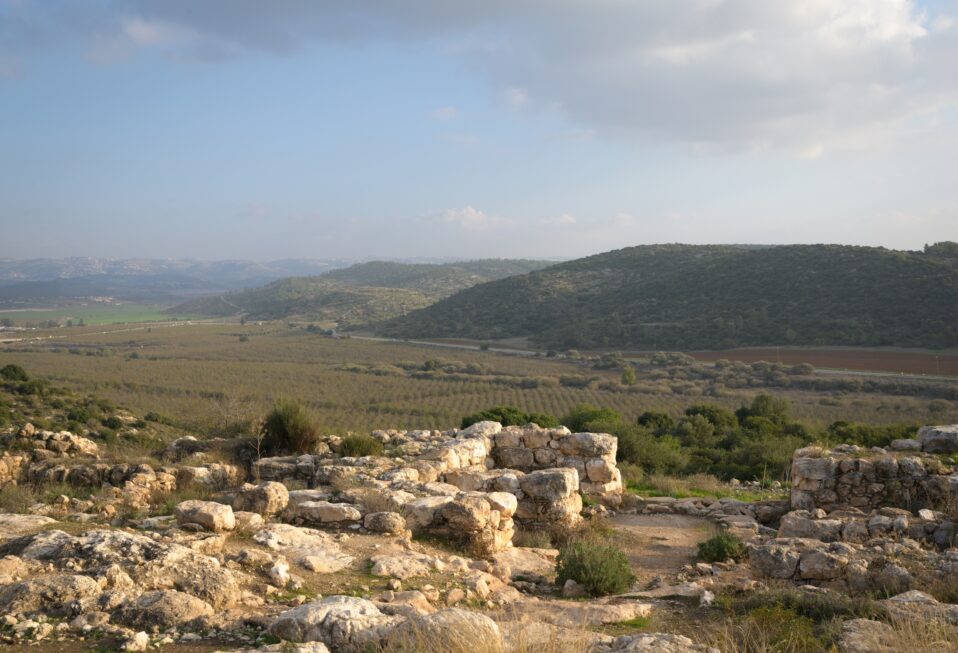By Stephen Faircloth
Scripture often speaks not only through words, but through the land itself. The hills, valleys, and roads of ancient Israel weren’t just a backdrop; they were part of the message. To walk the land is, in many ways, to walk into the heart of the Bible’s message. One powerful example is the Elah Valley, a place etched forever in the memory of God’s people as the site where a shepherd boy’s faith overcame a giant’s threat.
This valley was not chosen at random. The biblical author of 1 Samuel 17 places the clash between David and Goliath right here for a reason. The geography tells a story that magnifies the miracle.
To picture it, imagine Israel as a loaf of bread: tall in the center and flat on either side. That center is the Hill Country, home to Bethlehem, where David was born. To the west lies the Coastal Plain, where the Philistines held power. Between them lies a transitional region called the Shephelah, a series of rolling hills and fertile valleys, natural highways between enemy territories. One such highway is the Elah Valley.
This valley was more than a battlefield. It was a threshold between light and darkness, between the people of God and the forces seeking to conquer them. On one end stood Gath, Goliath’s hometown, symbolizing defiance and brute strength. On the other stood Bethlehem, the city of David, symbolizing covenant, promise, and God’s chosen future.
When the Philistines encroached upon the Elah Valley, their aim wasn’t just a skirmish; they were advancing toward Bethlehem, toward the heart of Judah. Their movement was strategic, their goal clear: to gain a foothold in Israel’s highlands and disrupt the plans of God’s people.
Enter David.
Sent by his father Jesse to check on his brothers, David didn’t arrive at the battlefield by chance. He walked a path his ancestors had known, through a valley his enemies coveted. What began as an errand quickly became a divine appointment. Where others saw a giant, David saw an opportunity for God to be glorified. His courage was not rooted in military prowess but in a deep, immovable trust in the Lord of hosts.
Even today, you can stand in the Elah Valley and trace the brook where David chose five smooth stones. You can see where the Philistine forces gathered and where Saul’s army waited. The very land still whispers of that unforgettable moment when faith stepped forward, and fear fell.
The Elah Valley reminds us that battles, both ancient and personal, are often fought in in-between places. The terrain may feel uncertain, the threat intimidating. But it is precisely there, in that valley between opposing forces, that God often reveals His power.
As you read the story of David and Goliath, don’t just see a boy and a giant. See a valley of decision, where geography and destiny collided, and where God’s faithfulness shone through the courage of one who trusted Him completely.
When you understand the land, you begin to understand the heart of the story. And when you walk through the valleys of your own life, remember: the God of the Elah Valley still fights for His people.
Stephen Faircloth is the President of CBN Israel, an initiative dedicated to sharing the true story of the Jewish nation and inspiring a global community of Christians to stand with Israel and support her people in need. Our vision is to reshape the global conversation about Israel by fostering understanding, hope, and healing between Jews and Christians around the world. For more than 50 years, the Christian Broadcasting Network has supported Israel. By joining CBN Israel, you become part of this enduring legacy, transforming lives today and strengthening Christian support for Israel for generations to come.




Post a comment